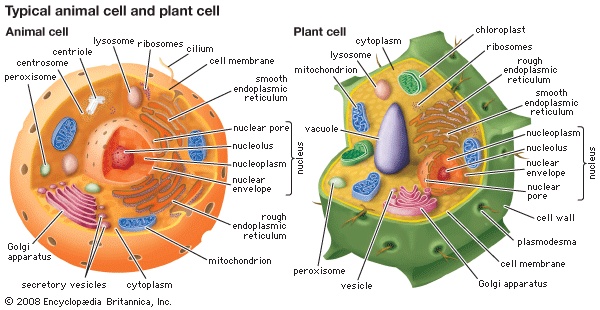peroxisome
biology
 membrane-bound organelle occurring in the cytoplasm of eukaryotic cells (cell). Peroxisomes contain enzymes (enzyme) that oxidize certain molecules normally found in the cell, notably fatty acids (fatty acid) and amino acids (amino acid). These oxidation reactions produce hydrogen peroxide, which is the basis of the name peroxisome. However, hydrogen peroxide is potentially toxic to the cell, because it has the ability to react with many other molecules. Therefore, peroxisomes also contain enzymes such as catalase that convert hydrogen peroxide to water and oxygen, thereby neutralizing the toxicity. In this way peroxisomes provide a safe location for the oxidative metabolism of certain molecules.
membrane-bound organelle occurring in the cytoplasm of eukaryotic cells (cell). Peroxisomes contain enzymes (enzyme) that oxidize certain molecules normally found in the cell, notably fatty acids (fatty acid) and amino acids (amino acid). These oxidation reactions produce hydrogen peroxide, which is the basis of the name peroxisome. However, hydrogen peroxide is potentially toxic to the cell, because it has the ability to react with many other molecules. Therefore, peroxisomes also contain enzymes such as catalase that convert hydrogen peroxide to water and oxygen, thereby neutralizing the toxicity. In this way peroxisomes provide a safe location for the oxidative metabolism of certain molecules.Peroxisomes have a special transporter system for taking up their enzymes from the cytoplasm. Mutations (mutation) in genes (gene) that encode the enzymes and transporter proteins (protein) of the peroxisome are responsible for a number of human diseases, including Zellweger syndrome, a congenital disorder characterized by complete absence or reduction in number of peroxisomes. Mutations giving rise to this syndrome cause copper, iron, and substances called very long chain fatty acids (fatty acid) to accumulate in the blood and in tissues, such as the liver, brain, and kidneys (kidney). Infants with Zellweger syndrome are often born with facial deformity and intellectual disability; some may have impaired vision and hearing and may experience severe gastrointestinal bleeding or liver failure. Prognosis is poor—most infants with this syndrome do not live beyond one year.
Peroxisomes were identified and described in the 1950s as part of the pioneering work of Christian René de Duve (Duve, Christian René de), who developed cell fractionation techniques. De Duve's method separated organelles based on their sedimentation and density properties; peroxisomes are denser than other organelles. De Duve shared the 1974 Nobel Prize for Physiology or Medicine with Albert Claude (Claude, Albert) and George Palade (Palade, George E.) for this work.
- New Zealand, flag of
- New Zealand Labour Party
- New Zealand literature
- New Zealand National Party
- New Zealand Political Reform League
- New Zealand short-tailed bat
- nexum
- Neyagawa
- Ney, Elisabet
- Neyman, Jerzy
- Ney, Michel, Duc D'elchingen, Prince De La Moskowa
- Neysa McMein
- Neyshābūr
- Nezahualcóyotl
- Neziqin
- Nez Percé
- neōteros
- Neşri
- Neẓāmī
- N.F.S. Grundtvig
- N.F. Simpson
- Ngada
- Ngaio Marsh
- Ngami, Lake
- Nganasan